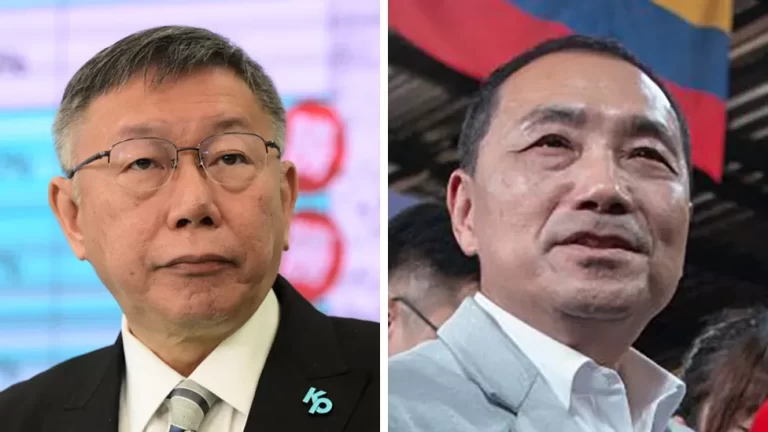Taiwan's two main opposition parties appeared to be on the brink of announcing their shotgun wedding – the leader of one would run for president in January's election; the leader of the other would be his running mate.
Saturday's unexpected deal would have shaken up the winner-takes-all race, posing the first real challenge to the ruling party, which is currently leading the polls.
But then the groom – or was it the bride? – got cold feet. The shotgun wedding was over before it had even begun, not least because there was never any love lost between the old nationalist Kuomintang party (KMT) and the newer Taiwan People's Party (TPP).
Both promise better ties with an increasingly aggressive Beijing – and a lower risk of war. This sets them apart from the incumbent Democratic Progressive Party (DPP), which has drawn closer to the US even as its rhetoric about an independent Taiwan has got louder.
But that is where the similarities end.
The KMT ruled Taiwan from 1945 until 2000. It still sees the presidential office building in Taipei as its natural home. And party leaders are certain they would be returning there next year, if it wasn't for who they see as a political upstart called Ko Wen-je.
The 64-year-old former surgeon has garnered a surprising amount of support in this election, particularly from young voters, on the back of a push for affordable housing. His detractors accuse him of being an opportunistic populist, with no real, consistent policies – and point to how wildly he has swung across the political spectrum during his career.
Back in the 1990s, Mr Ko was a staunch supporter of Taiwan's then opposition party, the DPP. In those days the DPP were the outsiders, fighting for full democracy and an end to decades of KMT dictatorship.

In 2000 Mr Ko campaigned for the DPP when its candidate won the presidency for the first time. Then in 2014 Mr Ko quit medicine and ran for mayor of Taipei – and the DPP supported him. He won, but success apparently convinced him he needed his own party.
In 2019 he founded the Taiwan People's Party. It would, he said, take the middle ground between the pro-Taiwanese independence DPP and the Beijing-friendly KMT. Now Mr Ko is running for president – and he's doing rather well. All summer and into the autumn he has been polling ahead of the KMT's candidate, Hou Yu-ih.
This is infuriating the old KMT grandees because the current DPP government, which has been in power for eight years, is not exactly popular. Their presidential candidate is the current vice-president, a soft-spoken doctor called William Lai Ching-te.
Mr Lai is not much of a campaigner. His poll ratings have gradually sunk, from over 40% in the summer to barely touching 30% now. But there is no run-off in Taiwan's winner-takes-all presidential race. Mr Lai can become president with just 30% of the vote.
Increasingly exasperated by their own candidate's failure to overtake Mr Lai and even Mr Ko, the KMT elders were forced to consider the unthinkable – an alliance with Mr Ko.
It felt like a long shot given Mr Ko's famously cantankerous personality, and the fact that he has repeatedly – and even recently – stated that he “hates the KMT”. But then last week, to everyone's shock, the two parties announced they would make a joint presidential bid.
All they needed now was data from “independent polling experts” to decide who between the two would run for president – and who for vice-president. By Friday night the two sides were rowing over which types of polling data were acceptable. By Saturday morning it was all over.
A rather chagrined Mr Ko told a room full of reporters that he had been tricked into the agreement – and that he should not have negotiated with the KMT alone, without any advisers present.

The DPP's spin doctors could hardly contain their schadenfreude. Mr Ko said he is still “willing” to negotiate, although he has also insisted he will be the TPP's presidential candidate. But time is running out because presidential candidates have to register by 24 November.
But for now, we are back where we started – an opposition that ranges from the KMT to the TPP, to billionaire businessman Terry Gou, who is running as an independent. They are all chasing the same voters in the hope of unseating the DPP, which has been in power since 2016.
The DPP has now revealed its own electoral weapon – vice-presidential candidate Bi-Khim Hsiao.
Since 2020 Ms Hsiao has been Taiwan's feisty and articulate representative to the United States. Her supporters jokingly refer to her as Taiwan's “cat warrior” – a jibe at China's combative, so-called “wolf warrior” diplomats.
It will be interesting to see what happens in the polls when Taiwan's cat warrior – charismatic and popular with young voters – hits the campaign trail.
— CutC by nbcnews.com


